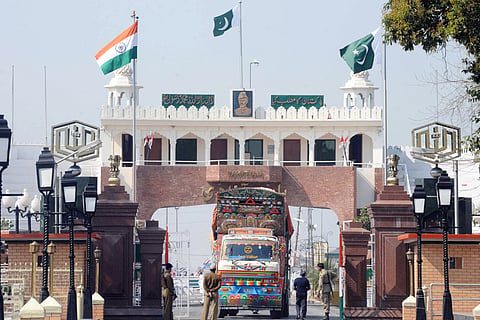

NEW DELHI: In response to growing tensions with Pakistan, the Indian government has completely banned all imports and transit of goods coming directly or indirectly from Pakistan. This includes all types of goods, whether they are usually allowed for import or not.
The decision comes amid escalating tensions between the two nations over the Pahalgam terror attack that killed 26 people.
Similarly, New Delhi also suspended the exchange of all categories of mail and parcels from Pakistan through air and surface routes. The order suspending the services was issued by the Department of Posts that operates under the Ministry of Communication.
Citing "cross-border linkages" to the horrific attack, India has promised severe punishment to those involved in the strike.
The decision to ban imports and transit of goods was made official through a new rule added to the Foreign Trade Policy (FTP) 2023. The ban takes effect immediately and will stay in place until the government decides otherwise. The government said the move is necessary for national security and public interest. If any exceptions are needed, they will require special approval from the Indian government.
Although the ban sounds major, trade between India and Pakistan is already very limited. In the current financial year (FY25), India has imported goods worth less than $0.5 million from Pakistan, while exports to Pakistan were around $500 million.
India had already made Pakistani imports expensive by adding a 200% tariff after the Pulwama attack in 2019, which brought imports down to just $0.42 million between April 2024 and January 2025.
Most of the recent imports were small items like figs, herbs such as basil and rosemary, and Himalayan pink salt.
Trade expert Ajay Srivastava from the Global Trade Research Initiative (GTRI) said the ban is more symbolic, as India does not rely on Pakistani products. However, he added that Pakistan might still need Indian goods and could continue to get them through third countries using legal or informal channels.
This trade ban follows a deadly attack in Pahalgam on Indian tourists, reportedly by terrorists trained in Pakistan. In response, both countries have also shut their airspace to each other’s airlines, further escalating the situation.
In the aftermath of the April 22 terror attack in Jammu and Kashmir’s Pahalgam—which claimed the lives of at least 26 civilians, including a Nepalese tourist and a local pony guide—India has taken a series of decisive actions after links to Pakistan-based terror outfits were established.
Citing "sustained cross-border terrorism," India suspended the Indus Waters Treaty, the 1960 water-sharing pact with Pakistan, paving the way to potentially divert or restrict the flow of Indus River waters into Pakistan — a move that could disrupt water access for millions.
In addition, India cancelled all visas issued to Pakistani nationals and ordered those residing in the country to leave, including individuals holding medical visas.
Pakistan, in turn, responded with threats to suspend all bilateral agreements with India, including the Simla Agreement. Diplomatic ties between the two nations have since been downgraded, with backchannel dialogue cut off amid rising hostilities.
India has also issued an official NOTAM (Notice to Airmen) barring access to its airspace for all aircraft linked to Pakistan.
The restriction applies to Pakistani-registered, operated, or leased aircraft, including both commercial and military flights. The ban will be in place till the early morning of May 24, as per the current NOTAM.
(With inputs from Online Desk)